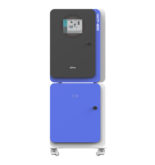Leading meteorological specialist Biral has had its BTD-300 Thunderstorm Detector installed at Eindhoven Air Base in the Netherlands.
Eindhoven Air Base is the home base of all the Royal Netherlands Air Force’s transport aircraft. Their most important task is the provision of military air transport for worldwide military operations, humanitarian missions and special assignments.
One year into the installation, Marcel de Pee Commanding Officer 941 Squadron at Royal Netherlands Air Force, took to LinkedIn to share with his 641 followers how pleased he is with the BTD-300 and how it has helped the air base.
He said, “We have again had some nice thunderstorms, we’re pleased with that. Not just for aviation reasons, because aviation and thunder are not the best combination, but to test the setup of Biral’s BTD-300, the innovative storm detection system that has been at the airport for a year. Our airport meteorologist is promptly alerted if there are discharges within 3.6 kilometres of the airport, which protects our employees and passengers so all operations can be shut down. It has been a great first year of pioneering!”
The comment has attracted much attention from those in the aviation market, with responses and likes across the industry.
Rob Ter Brake, Business Development Manager, OTT Hydromet, said, “Great that this innovation has proven itself.”
Leo de Pee, AO Consult B.V. (eigenaar). Open Universiteit, said it “added a piece of security” to the air base.
Yvonne Ringma, Helicopter Pilot, AS332L2, offshore, former Dutch military pilot said, “This has indeed proved to be a very nice tool and we gain more confidence in the observations it gives.”
In the military setting, having a local hard-wired, dedicated warning system is a significant benefit over a regional networked solution, which will rely upon internet and mobile communications to issue its warnings. Both of which would be restricted (or unavailable) at times of crisis or conflict.
The BTD-300 Thunderstorm Detector is a standalone sensor that reliably detects the presence of all forms of lightning to a range of 83 km. The unique quasi electrostatic operating principle gives the detector a very low false alarm rate and the ability to warn of the risk of overhead lightning.
The ability to reliably detect and range cloud-to-cloud lightning, which is typically much more common than cloud-to-ground strikes, makes the BTD-300 much more sensitive to the presence of storms compared to devices that rely on radio detection. The electrostatic operating principle allows the sensor to warn of the risk of overhead lightning before the first discharge occurs.



